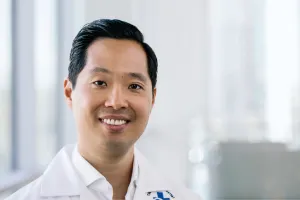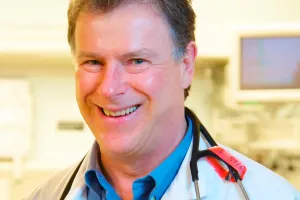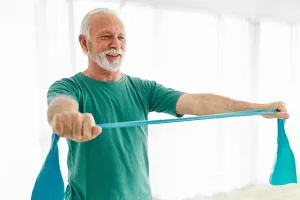Golfer credits Ottawa study for quick recovery after lung cancer surgery
.jpg) When researchers at The Ottawa Hospital told her about the study, Marie Lapointe knew right away she wanted to be involved.Six weeks after having lung cancer surgery, Marie Lapointe was back to golfing several times a week. She credits her quick recovery to the exercises she did at home before the surgery as part of a pilot study at The Ottawa Hospital.
When researchers at The Ottawa Hospital told her about the study, Marie Lapointe knew right away she wanted to be involved.Six weeks after having lung cancer surgery, Marie Lapointe was back to golfing several times a week. She credits her quick recovery to the exercises she did at home before the surgery as part of a pilot study at The Ottawa Hospital.
"There's no doubt in my mind that the exercise made a huge difference in my recovery," said the 66-year-old retired public servant.
Led by scientist and anesthesiologist Dr. Daniel McIsaac, this pilot trial is one of the few of its kind in the world. Dr. McIsaac's research goal is to help older patients who may have a harder time recovering from surgery because of medical conditions or reduced physical or mental health.
Marie was eligible for the trial because she had a health condition that made exercise difficult. Her back would start hurting after only 30 minutes of walking, due to a problem with the shock-absorbing cushions in her spine known as herniated disks.
When researchers at The Ottawa Hospital told her about the study, Marie knew right away she wanted to be involved.
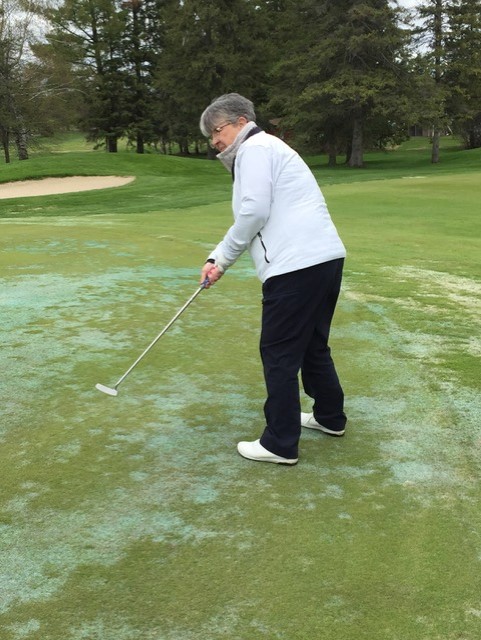 Marie Lapointe took part in a pilot study at The Ottawa Hospital aimed at testing whether a home-based exercise program could help older people better prepare for surgery "I knew that I should be exercising more," said Marie. "But I'm the kind of person that if they check on me, I'll do it a lot better. Because it was a study, I thought, 'I have to do this and do it right.'"
Marie Lapointe took part in a pilot study at The Ottawa Hospital aimed at testing whether a home-based exercise program could help older people better prepare for surgery "I knew that I should be exercising more," said Marie. "But I'm the kind of person that if they check on me, I'll do it a lot better. Because it was a study, I thought, 'I have to do this and do it right.'"
The research coordinators gave Marie written instructions and videos demonstrating how to do a series of strengthening exercises at home. Many of the exercises targeted her leg and abdominal muscles, which are important for getting up out of bed after surgery.
For six weeks Marie diligently performed the exercises six times a week. She also went on regular walks. She began by ambling at a relaxed pace, but as the weeks went by she was walking faster and faster. Eventually she was walking 2.5 km in 30 minutes.
"It was amazing. I was in such good shape. Even my friends noticed that I was walking better," she said. "My lungs were way better, and I had a lot more energy. I felt really great. But the most amazing part came after surgery."
Thoracic and abdominal surgery often takes a major toll on the body. But within two weeks of having the left upper lobe of her lung removed, Marie could walk 2.5 km again. In three weeks, she was back to doing it in 30 minutes. In six weeks, she was back to her normal schedule of golfing two to three times a week.
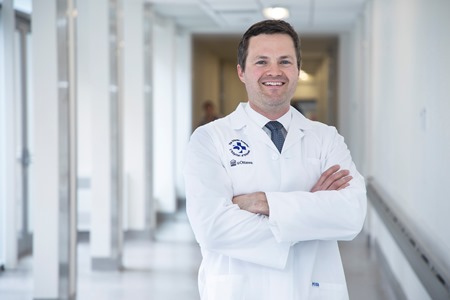 Dr. Daniel McIsaac's research goal is to help older patients who may have a harder time recovering from surgery because of medical conditions or reduced physical or mental health.
Dr. Daniel McIsaac's research goal is to help older patients who may have a harder time recovering from surgery because of medical conditions or reduced physical or mental health.
After all that exercise, she found her back wasn't hurting as much. This meant she could go on longer walks.
"This was a huge bonus that I wasn't expecting, she said "I walked my dogs before, but I wasn't very good at it. Now I'm much better and my dogs are happier."
The pilot trial in patients having cancer surgery is ongoing, and the research team still needs to analyze the results. However, what they've seen so far is promising enough that they are planning a national trial of the home-based exercise program across 11 Canadian hospitals, which won't be limited to cancer patients. They want to see if patients who do the exercises before having major surgery report lower levels of disability and complications in the months after their surgery.
Project leads Dr. McIsaac, Dean Fergusson, Rachel Khadaroo, John Muscedere and Monica Taljaard were recently awarded $1.1 million from Canadian Institutes of Health Research and $100,000 from The Ottawa Hospital Academic Medical Organization to fund this national trial.
"I'm very excited about this research because it has the potential to make surgery safer for older people who might have a harder time recovering," said Dr. McIsaac, also an assistant professor at the University of Ottawa. "We've put together a world-class team of anesthesiologists, surgeons, geriatricians and exercise scientists to lead this project. Over 50 percent of Canadians having major surgeries are over age 65, and improving outcomes for these patients is more important than ever."
Research at The Ottawa Hospital is possible because of generous donations to The Ottawa Hospital Foundation. This pilot trial at The Ottawa Hospital is funded by the International Anesthesia Research Society, the Canadian Frailty Network, the Canadian Anesthesiologists' Society and the University of Ottawa Department of Anesthesiology and Pain Medicine.
About The Ottawa Hospital: Inspired by research. Driven by compassion.
The Ottawa Hospital is one of Canada's largest learning and research hospitals with over 1,100 beds, approximately 12,000 staff and an annual budget of over $1.2 billion. Our focus on research and learning helps us develop new and innovative ways to treat patients and improve care. As a multi-campus hospital, affiliated with the University of Ottawa, we deliver specialized care to the Eastern Ontario region, but our techniques and research discoveries are adopted around the world. We engage the community at all levels to support our vision for better patient care. See www.ohri.ca for more information about research at The Ottawa Hospital.
University of Ottawa: --A crossroads of cultures and ideas
The University of Ottawa is home to over 50,000 students, faculty and staff, who live, work and study in both French and English. Our campus is a crossroads of cultures and ideas, where bold minds come together to inspire game-changing ideas. We are one of Canada's top 10 research universities--our professors and researchers explore new approaches to today's challenges. One of a handful of Canadian universities ranked among the top 200 in the world, we attract exceptional thinkers and welcome diverse perspectives from across the globe. www.uottawa.ca
Media Contact: Amelia Buchanan, Senior Communication Specialist, Ottawa Hospital Research Institute; ambuchanan@ohri.ca; Cell: 613-297-8315
Learn more about:
The Ottawa Hospital is a leading academic health, research and learning hospital proudly affiliated with the University of Ottawa and supported by The Ottawa Hospital Foundation.
